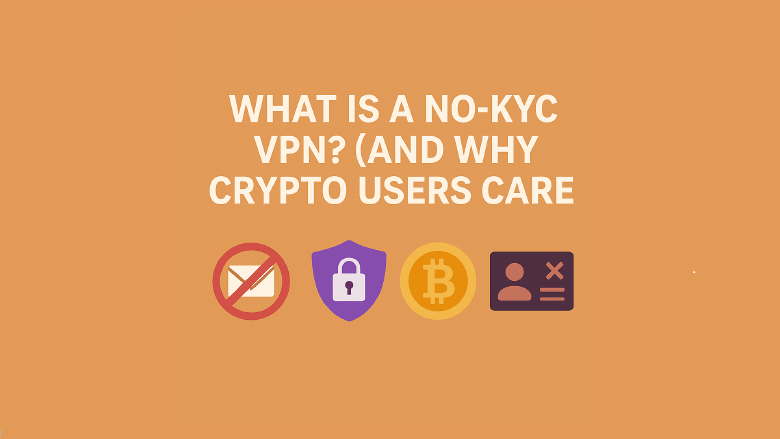What Is a No-KYC VPN? (And Why Crypto Users Care)

🧾 Know Your Customer (KYC), Crypto, and Why Privacy-Focused VPNs Skip It
Most people associate KYC (Know Your Customer) with banks or crypto exchanges. But if you’re serious about staying anonymous online, understanding how KYC works—and how some VPNs avoid it—can help you make better choices.
🔍 What Is KYC, Really?
KYC is a legal process that banks, crypto exchanges, and fintech apps use to confirm who you are. It’s the first step in preventing money laundering and stopping criminals from using these platforms for shady stuff.
Here’s what KYC usually means:
- Identity checks: You hand over your name, address, birthday, and photo ID.
- Risk screening: They compare your info against watchlists like sanctioned individuals or politically exposed persons (PEPs).
- Monitoring: Once you’re in, your transactions might be monitored or flagged if they look suspicious.
These steps are required by anti-money-laundering (AML) laws in most countries—and enforced by groups like the Financial Action Task Force (FATF).
But there’s a catch: not all digital tools are financial services. And VPNs fall outside those rules.
🕵️♂️ Why Some VPN Users Avoid KYC
If you’re paying for privacy, the last thing you want is to give up your identity. But many VPNs still ask for an email or credit card—leaving a trail that can be linked back to you.
Privacy-first VPNs do things differently:
- No accounts or emails.
- No names or addresses.
- Payments in crypto or even cash.
These VPNs aren’t banks or exchanges. So they’re not legally forced to verify users. And that’s good news if you’re trying to keep your online identity separate from your real-life one.
🔐 What Makes a VPN Truly No-KYC?
Let’s break it down:
| Feature | What No-KYC VPNs Do | Real-World Examples |
|---|---|---|
| Account setup | No email or password. Just a random code or token. | Mullvad gives you a 16-digit number. LNVPN and CryptoStorm skip accounts entirely. |
| Payment | Accept anonymous payments. | Bitcoin, Monero, and even cash—Mullvad, IVPN, CryptoStorm all support them. |
| Personal data | Don’t ask for it. Don’t store it. | No name, phone, or email needed to sign up. |
| Authentication | Use tokens or random IDs—not usernames. | CryptoStorm tokens are hashed before use. Mullvad and IVPN use ID-only logins. |
| Logging | Keep no logs at all. Often use RAM-only servers. | LNVPN and others say they keep zero records. |
| KYC | Not required—and they make that clear. | CryptoStorm, LNVPN, and others proudly state “No KYC.” |
💡 VPNs That Don’t Do KYC
Here are four popular no-KYC VPNs that make privacy a priority:
🔸 LNVPN
- No app, no account, no email.
- Pay with Monero or Bitcoin.
- Instant access, zero logs.
🔸 Mullvad
- Random 16-digit ID.
- Accepts Monero, Bitcoin, and cash.
- Doesn’t ask for name or email.
🔸 IVPN
- Auto-generated account number.
- No personal info required.
- Crypto-friendly and no tracking.
🔸 CryptoStorm
- Sells access tokens (not accounts).
- Tokens are hashed—can’t be traced.
- Monero payments need no email at all.
These aren’t just marketing claims. They’ve been reviewed by privacy advocates, tested by users, and openly document how they avoid identity collection.
❓ So… Why Doesn’t Every VPN Skip KYC?
Because they don’t have to—but they still want your data.
Most commercial VPNs aren’t legally required to do KYC. But they still ask for:
- An email (for marketing or account recovery)
- A card payment (which reveals your identity)
That might be okay for casual use—but it’s not great for privacy.
Privacy-first VPNs take it further: no emails, no card details, and no logs. That’s why crypto users, journalists, and privacy advocates often recommend them.
🧾 TL;DR Summary
- KYC is a legal requirement for banks and crypto exchanges to verify users.
- VPNs aren’t financial services—so they don’t need to do KYC.
- Some VPNs still collect personal info. Privacy-first ones don’t.
- No-KYC VPNs avoid accounts, accept crypto or cash, and log nothing.
If staying anonymous matters to you, a no-KYC VPN is worth it.
